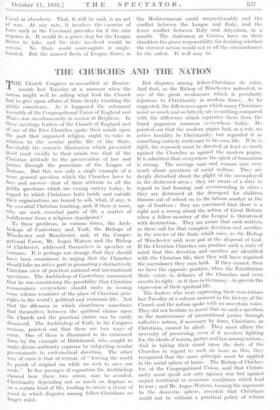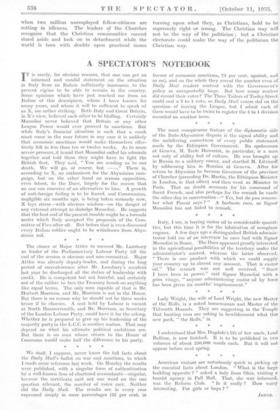THE CHURCHES AND THE NATION
THE Church Congress re-assembled at Bourne- mouth last Tuesday at a moment when the nation might well be asking what lead the Church had to give upon affairs of State deeply touching the Public conscience. As • it happened the autumnal assembly of the Congregational Union Of England and Wales was simultaneously in session at Brighton. In these meetings leaders of the Church of England and of one 'of the 'Free Churches spoke their minds upon the part that organised religion ought to take in relation to the secular public life of the State. Inevitably the concrete illustration which presented itself most vividly to their minds was that of the Christian attitude to the preservation of law and Justice through the procedure of the League of Nations. But this was only a single example of a more general question which the Churches have to f ace and answer—that of their attitude to all the public questions which are vexing society today, in regard to which Christians both inside and outside their organisations are bound to ask, what, if any, is the essential Christian teaching, and, if there is none, why are such essential parts of life a matter of Indifference from a religious Standpoint To these problems, in various forms, the Arch- bishops of Canterbury and York, the Bishops of WineheSter and Manchester, and, at the Congre- gational Union, Mr. Angus Watson and the Bishop of Chichester, addressed 'themselves in speeches or sermons. It is perhaps not strange that they should have been unanimous in urging that the Churches should take an active part in promoting a distinctively Christian • view of practical national and international questions. The Archbishop of Canterbury announced that he Was considering the possibility that Christian communions everywhere should unite in issuing some solemn reminder of the place of Christian prin- ciples in the world's political and economic life. Not that the dilemma in which churchmen sometimes find themselves between the spiritual claims upon the Church and the practical claims can be easily dismissed. The Archbishop of York, in his Congress sermon, pointed out that there are two ways of error. 'One of these is illustrated in its extremest form by the example of Hildebrand, who sought to make divine authority supreme by sUbjecting secular governMents to ecclesiastical direction. The other Way of error is that of retreat, of " leaving the world to perish of original sin while we seek to save our souls." In fine passages of exposition the Archbishop ShOwed how these two errors may be avoided, Christianity depending not so much on dogmas as on. a certain kind of life, tending to create a frame of initid in which disputes among fellow-Christians no longer exist. But disputes among fellow-Christians do exist. And that, as the Bishop of Winchester indicated, is one of the great weaknesses which is peculiarly injurious to Christianity in modern times. As he Suggested, the differences upon which many Christians insist so much and so bitterly are as nothing compared with the difference which separates them from the frank paganism common everywhere today. He pointed out that the modern pagan had, as a rule, no active hostility to Christianity, but regarded it as something entirely irrelevant to his own life. If he is right, the reproach must be directed at least as much against the Churches as against the modern pagan. It is admitted that everywhere the spirit of humanism is strong. The average man. and woman care very much about questions of social welfare. They are deeply disturbed about the plight of the unemployed in the distressed areas ; they are aware of a duty in regard to bad housing and overcrowding in cities ; they are distressed at the disregard for children thrown out of school on to the labour market at the age of fourteen ; they arc convinced that there is a right and a wrong about the action of Great Britain when a fellow-member of the League is threatened with destruction. They are aware that such matters as these call for that complete devOtion and sacrifice in the service of the State which once, as the Bishop of Winchester said, were put at the disposal of God. If the Christian Churches can produce such a state of mind that this devotion and sacrifice are identified with the Christian Mei then they will have regained the ascendancy they once held. If they cannot, then we have the opposite position, when the TOtalitarian State exists in. defiance of the Churches and even asserts its right—as it does in Germany—to govern the expression of their spiritual life. The leaders who were expressing their convictions last Tuesdayat a solemn moment in the history of the Church and the nation spoke with no uncertain voice. They did not hesitate to assert that on such a question as the maintenance of international justice through collective action, if necessary by force, Christians, as Christians, cannot be silent. They must affirm the necessity of preserving, even if it involves fighting for, the ideals of reason, justice and law among nations. And in taking their stand upon the duty of the Churches in regard to such an issue as' this, they recognised that the same principle must be applied in the social sphere at home. The Bishop of Chiches- ter, at the Congregational Union, said that Christi- anity must speak not only against war but 'against unjust territorial or economic COnditions which lead to war ; and Mr. Angus Watson, turning the argument to the domestic sphere, asserted that Christians could not be without a practical policy of reform when two million unemployed fellow-citizens are rotting in idleness. The leaders If the Churches recognise that the Christian communities cannot stand aside and look on in detachment while the world is torn with doubts upon practical issues turning upon what they, as Christians, hold to be supremely right or wrong. The Christian way will not be the way of the politician ; but a Christian electorate could make the way of the politician the Christian. way.































































 Previous page
Previous page